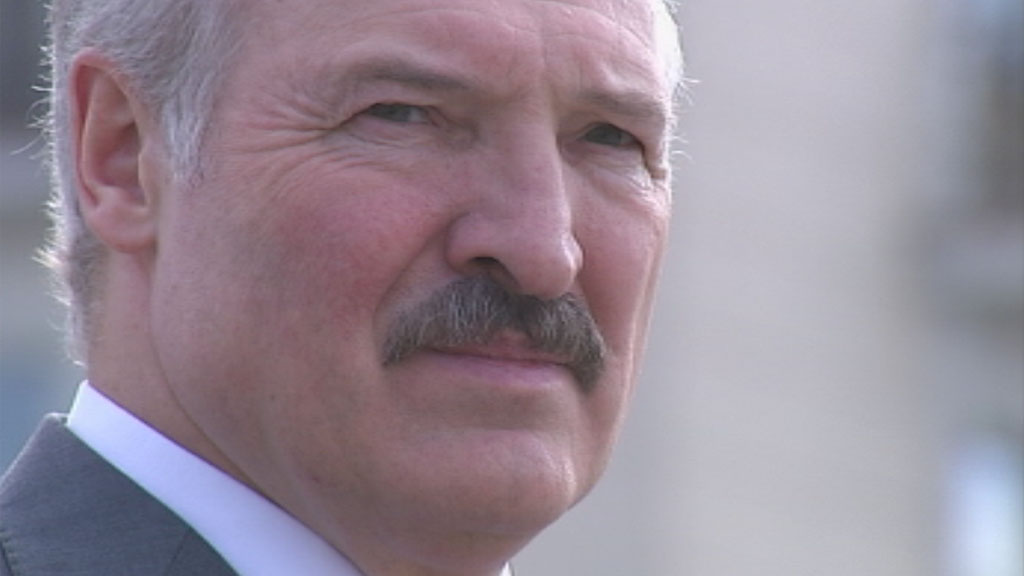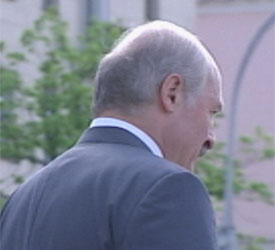Undercover in Europe’s last dictatorship
Belarus border guards order me out of the country, but our resourceful Channel 4 News cameraman slips past them for a much-needed glimpse of Europe’s most repressive regime.
I suppose I should wear it as a badge of honour that I have been banned from a dictatorship like Belarus.
It happened earlier this month, when Belarusian border guards escorted me off a train from Lithuania during a routine passport check. They were wearing green peaked caps and coats, like extras from some cold war movie Sean Connery only made for the money towards the end of his career and might have regretted. Appropriately enough, given Belarus is a living museum, trapped in its Soviet Communist past.
“Something wrong with your passport,” the guards kept saying in between frantic phone calls to some unseen controller, before putting me on the next train back to Vilnius.
I had applied for and been granted a multiple entry working visa to “Europe’s last dictatorship” but after my first visit in March I received an email from the Belarus embassy in London telling me the visa had been cancelled.
When the British Embassy in Minsk asked the foreign ministry why, the reply came back that it is “not within our competence to discuss this matter”.
KGB at work?
Either nobody knew or nobody wanted to know why I had been banned, given the fear of President Alexander Lukashenko and his formidable security apparatus.
My Belarusian friends assumed the KGB had given the order to cancel my visa – Belarus is the only former Soviet state still to call its intelligence agency the KGB – but I still clung to the hope of another visit: a visa was not required for journalists visiting during the World Ice Hockey Championships in May.
You see, the Belarusians I have met – apart from their KGB man stationed in London, the one with the snake eyes I had coffee with in Kensington – are among the saddest and most engaging people I can remember meeting, with a story that desperately needs to be told.
Belarus lost over two million people during the second world war, only to be liberated by the Red Army of Josef Stalin, who then resumed his “purges” which left hundreds of thousands dead. The stuffing was comprehensively knocked out of the place and it has never really recovered. Because when the Soviet Union collapsed, Belarusians made the mistake of electing an unknown collective farm manager called Alexander Lukashenko in the first democratic elections of 1994.

Mr Lukashenko, 59, is now celebrating his 20th anniversary in power, having rigged every subsequent election, neutralised the parliament, locked up his rivals and censored the press. The former British Ambassador in Belarus, Brian Bennett, reckons Lukashenko may well be mentally unhinged, but could govern this nation of 10 million people for decades to come.
Demonstrations are banned and defaming the state is a criminal offence. The president has proposed an amendment to the law allowing security forces to shoot protesters in case of riots.
It is a film about how a former chicken farmer and keep fit fanatic now rules the roost, a man obsessed with ice hockey – though it is forbidden to bump into him on the ice.
The only European country with the death penalty executes prisoners with a gunshot to the back of the head – there were two such executions recently. But Belarus has such suffering imprinted in its national memory that even Lukashenko’s crimes are deemed tolerable by many; and the chaos of neighbouring Ukraine has served as a reminder that if you ditch a strongman subsidised by Moscow, things could get far worse. Better the devil you know and all that.
“Let them come, let them look, we won’t hide anything” the dictator told the Belarusian parliament in his annual address last month, announcing that there would be no restrictions on foreign reporters attending the World Ice Hockey championships.
Against the odds
I was accredited as a correspondent for this event. I had even gone to Minsk and met the tournament’s organisers, toured the brand new hockey stadium and discussed the intricacies of the game with the manager of the national team.
But, as it turned out, Mr Lukashenko’s words were meaningless: my letter of accreditation was dismissed by the Belarusian border guards. I was now banned and nobody in this dictatorship needed to tell me why.
However, sitting a safe distance from me in that train carriage was my friend, a Channel 4 News cameraman; not only did he not get off the train, but by pretending not to know me he succeeded in reaching Minsk. Which goes to show that dictatorships are sometimes not as joined up in their thinking as one might think.
So our film about Lukashenko has been made against the odds. It is a film about how a former chicken farmer and keep fit fanatic now rules the roost, a man obsessed with ice hockey – though it is forbidden to bump into him on the ice; a dictator of the old school, so paranoid that it is forbidden to broadcast pictures of the back of the president’s head.

Aside from the terrific camera work – he filmed the back of the president’s head as well as the KGB headquarters and got away with it – this is a film which would never have been made had not a small army of ordinary (and by necessity nameless) Belarusians taken risks on our behalf.
The reason they did so is simple; the country they love falls off the news map so often that any chance to put it back on the agenda is welcome.
Ukraine, rightly, is garnering more attention. But if you want to know what the Russian model of a supplicant state looks like – one which more or less does what Moscow says – go next door to Belarus. If you can.
Follow @jrug on Twitter